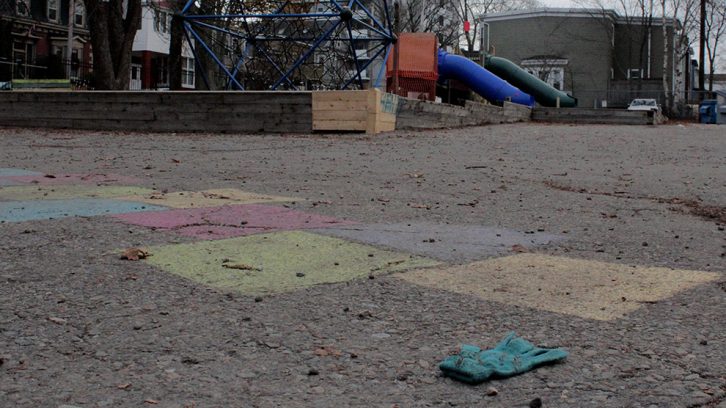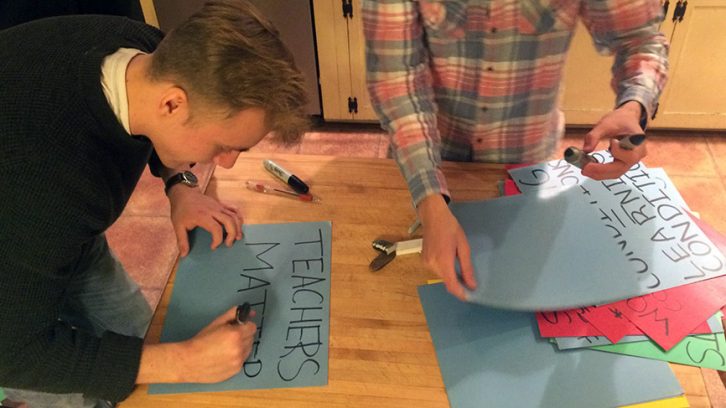Teachers
Students plan walkout to support teachers ahead of job action
‘Their working conditions are my learning conditions’

caption
The work-to-rule job action begins on Dec. 5 for all NSTU members.
caption
The work-to-rule job action begins on Dec. 5 for all NSTU members.Students are planning a Nova Scotia-wide walkout on Friday afternoon to send a message of solidarity to teachers.
“Teachers are fighting for their working conditions and their working conditions are my learning conditions,” said Manuel Moncayo-Adams, a student at Dartmouth High School on Tuesday. “I’m a Grade 12 student, so anything that affects my education right now is hugely important to me.”
Plans for the walkout started after Moncayo-Adams spoke on behalf of Students for Teachers at a public forum on Sunday hosted by Nova Scotia Parents for Teachers at Saint Mary’s University. Related stories
Moncayo-Adams said students in Amherst, Springhill, Neil’s Harbour, Eskasoni, Yarmouth and Digby have expressed interest in participating in the walkout. So far, students from over 20 schools across the province have confirmed on the Student for Teachers Facebook group that they will walk out.
“I can’t help but notice how in recent years there’s been less resources at my disposal,” said Moncayo-Adams.
Earlier this week, the Nova Scotia Teachers Union (NSTU) announced that work-to-rule job action would begin on Dec. 5 for 9,300 members. All classroom and specialist teachers, administrators, school psychologists, speech language pathologists and school board consultants will limit their duties to the minimum rules of their contracts.
It means union members will no longer arrive early or stay late after school. Extra-curricular activities and field trips will halt, while data collection and meeting attendance will be limited.

caption
Students make posters after school to prepare for Friday’s rally.Lindsey Lowthers, a Grade 12 student at Central Kings Rural High School in the Annapolis Valley, is organizing the walkout at her school. Out of 500 students, she hopes around half will participate.
“I decided to get involved because the teachers have always really backed me,” said Lowthers. “As a community, we want to thank them for that. Teachers go out of their way to make our high school experience the best it can be.”
As a nurse who has volunteered in public schools, Lorraine Yerian thinks the work-to-rule job action is “long overdue.” Her daughter is in Grade 7 at Elizabeth Sutherland School in Halifax.
“I think it’s a great first step for my daughter to learn exactly what teachers do,” Yerian said. “I support their actions 100 per cent; there are so many things broken in the schools.”
Yerian believes work-to-rule will help parents see the work teachers do beyond their contracts, while ensuring parents aren’t left without child care.
Trish Keeping is organizing a rally on Monday at Halifax’s Grand Parade to show support for teachers.
“I have a grandson who is 10 years old,” Keeping said. “He is a pretty active boy and they do a lot of extra-curricular activities at school, so he’ll absolutely be affected.”
Although her grandson will be affected, Keeping supports work-to-rule.
“I believe what teachers are trying to tell us is that the work loads they have and the situations they’re working in are getting to the point where it’s harder to control,” she said.
Ilan Sandler’s children attend LeMarchant St. Thomas Elementary in south-end Halifax, but he isn’t concerned with the work-to-rule job action.
“There will be a few extra-curricular activities during lunch and after school that will be affected, but that’s a minor concession if teachers can get a better deal,” he said.
However, Sandler said if schools close down there will be a “huge affect on most families,” including his.
“If they go fully on strike beyond work-to-rule, then we have a child-care issue,” Sandler said. “As most families do, we both work.”
Talks between the NSTU and the province broke down last Friday. Education Minister Karen Casey said at a media conference earlier this week that she was discouraged about it.
“There’s a gap between what the province can afford and what teachers are asking for,” Casey said.

